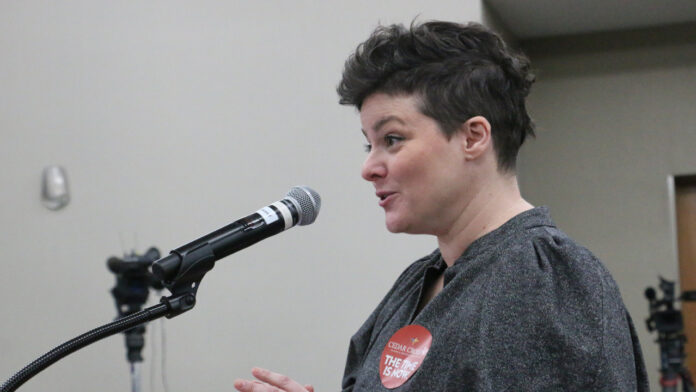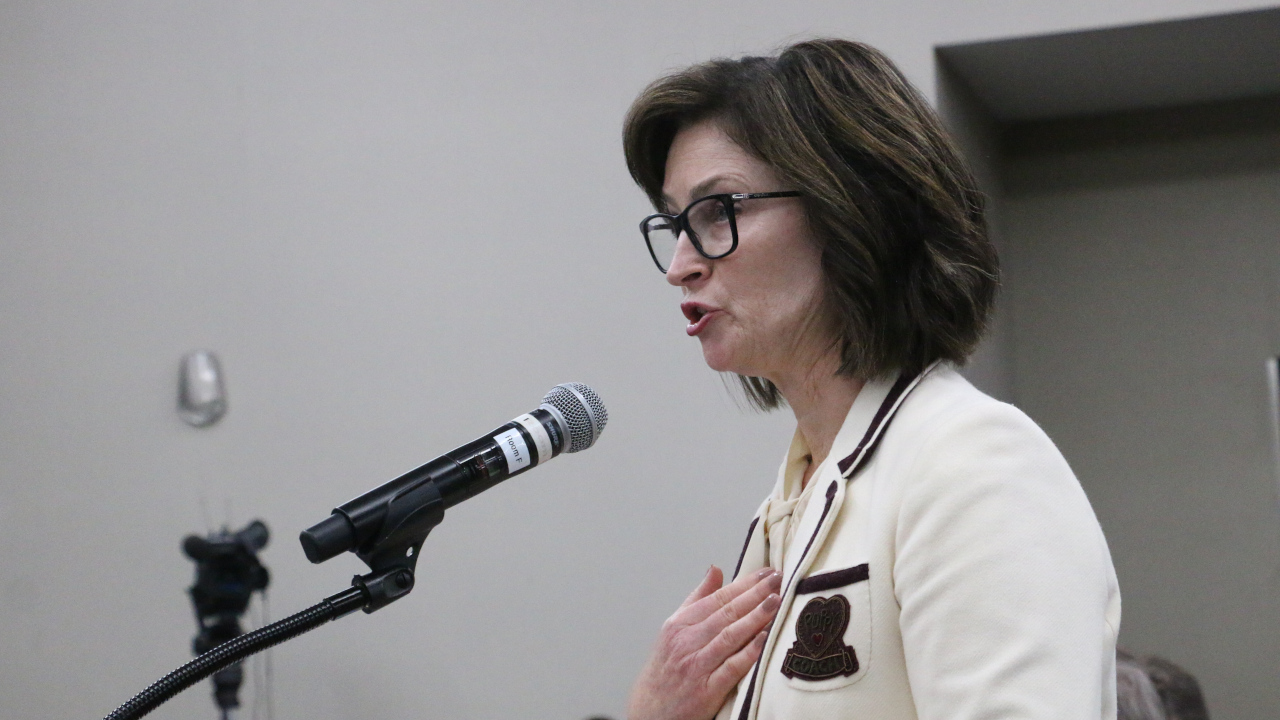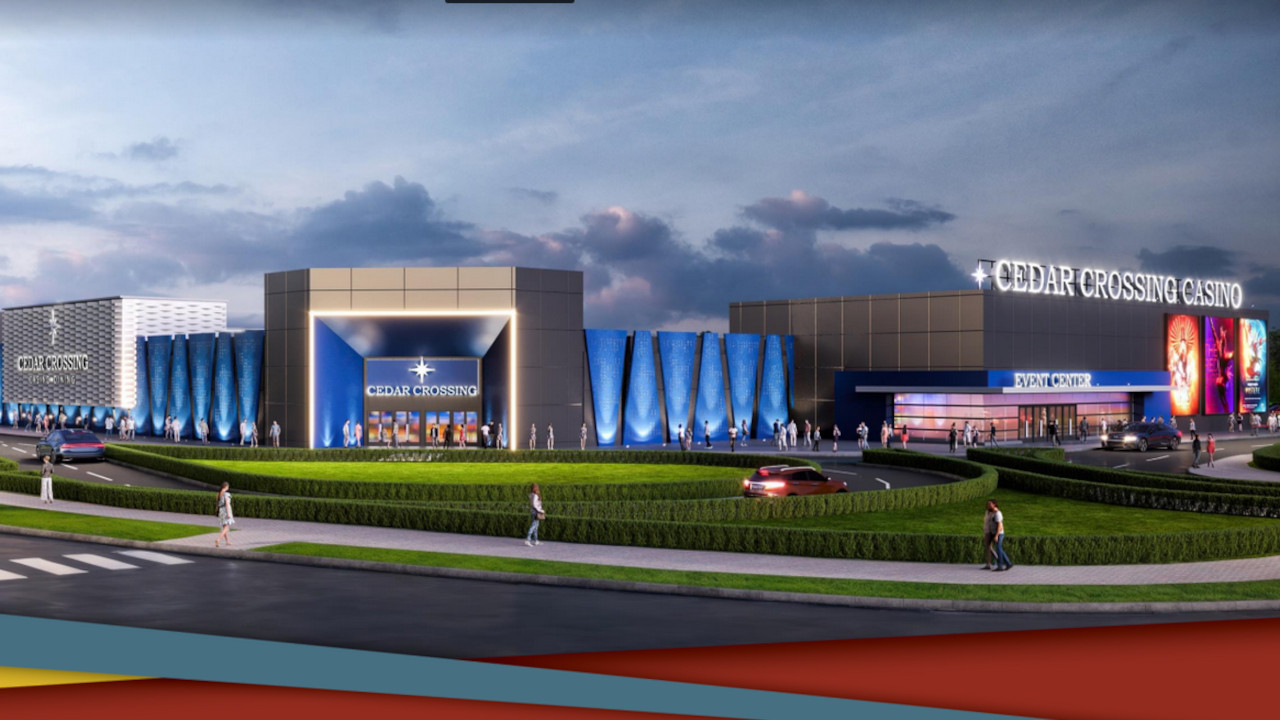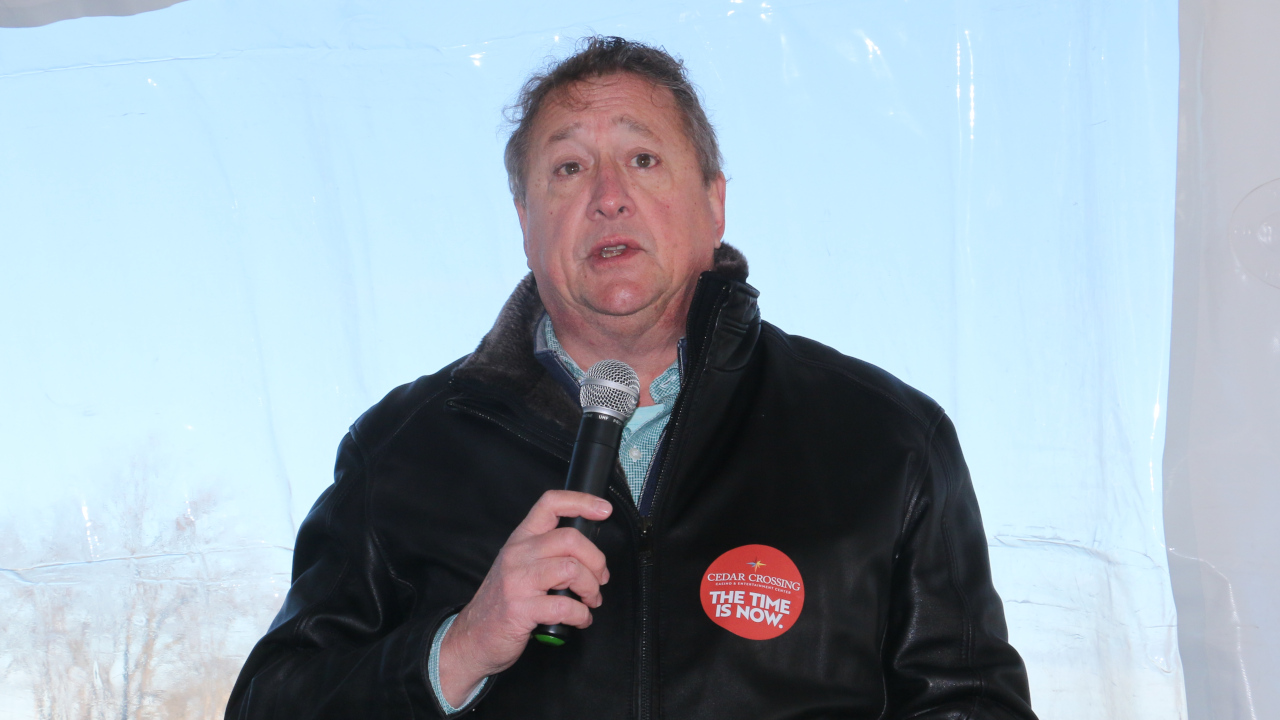
More than 100 commenters voiced their views on a proposed Cedar Rapids casino during a public input session Wednesday, Nov. 20 at Kirkwood Community College hosted by the Iowa Racing and Gaming Commission.
About two-thirds of the commenters spoke in favor of the casino gaming application from Peninsula Pacific Entertainment (P2E) and the Cedar Rapids Development Group, while the other third said they were opposed to the gaming license.
The $275 million casino project, dubbed Cedar Crossing, would house 700 slot machines and 22 table games, but developers say it would also provide a “comprehensive entertainment destination” with amenities such as a 1,500-seat entertainment venue, several restaurants, an arts and cultural center, a STEM (Science, Technology, Engineering and Mathematics) lab for area students, and a shuttle service that will connect casino patrons with local hotels and attractions.
Issues raised by commenters centered on several key issues, including:
- Competition – with existing casinos across Eastern Iowa, new casino ventures in Illinois, Nebraska and Wisconsin, and new online gambling options;
- “Cannibalization” of revenue from the state’s 19 existing state-licensed casinos;
- Fairness, for Cedar Rapids, as the state’s second-largest city, to have the same casino opportunity as other parts of the state already enjoy;
- The promise of 8% of casino proceeds being donated to area nonprofits – the highest percentage of any casino in the state, which would generate an estimated $6 million-plus in annual revenue for those nonprofits;
- Up to 1,000 construction jobs for local trades workers, and more than 500 permanent jobs for ongoing casino operations; and
- A new entertainment destination that would attract an estimated 1.2 million visitors per year, for a city that, according to some speakers, lacks a marquee attraction.
Many of the opponents speaking Wednesday said they represented existing casinos in Eastern Iowa and the communities where those casinos are located, including Dubuque, Waterloo, Riverside and the Quad Cities.
Alex Dixon, president and CEO of the Q Casino and Resort in Dubuque, acknowledged that while a new casino in Cedar Rapids would not be “catastrophic” for the Dubuque gaming market, a loss of up to 9% of current revenue would be “very significant” and would bring a sense of unease for future casino improvements.
“The reality is, you don’t need a catastrophe to limit capital investment,” Mr. Dixon said. “All you need is uncertainty. All you need is an excuse, in a more callous perspective. What we’re talking about is an excuse for the commercial developers and casino operators not to make investments within the state.”
Mr. Dixon said that Q Casino is building a $155 million public-private reinvestment, and that as one of two nonprofit casinos in the United States, Q Casino returns nearly 23% of its revenue back to the city of Dubuque and Dubuque County.
“We’re proud stewards of our privileged license, and we hope that you will speak up for Dubuque in this process,” he said.

Rick Dickinson, president of the Greater Dubuque Development Corporation, began his remarks with a simple admonition: “Please, do no harm.”
He noted that the commission decided in 2014, and again in 2017, to deny a casino license for Linn County, largely based on the notion that the state’s casino gaming market was saturated.
Holding a smartphone, Mr. Dickinson continued by saying “in 2024, not only is it full saturation, but anyone that has one of these (phones) has a casino in their hand. Gaming is no longer about saturation. Gaming in Iowa is omnipresent.”
Supporters focused their comments largely on the jobs that would come from the construction and operation of a new casino, on the new entertainment options and community visitors a casino would bring, and the support a casino would provide for nonprofit organizations.
One commenter, Lydia Brown, vice president of business development for Midwest Equity Investors, also serves as chair of the Four Oaks and the Affordable Housing Network boards and vice chair of the Mercy Medical Center Foundation.
“I see every day the needs in our community,” Ms. Brown said. “And I appreciate what has been said here today from those communities and the benefits that they are receiving from their casinos. But it’s our turn, and it’s our time … for those of you that may have had the opportunity to come here immediately following the 2008 flood and see the devastation in our downtown core district, including what is going to be the site for the new casino, you would understand how far we’ve come, but how far we still have to go. We’ve had the opportunity to have some really great wins, and I hope that we continue to do that, but this is just one more thing that allows this community to be stronger and to give our residents and this county, including the rural communities that are in Linn County, the benefits of having a casino.”
Allan Thoms of Cedar Rapids, former chair of the Iowa Utilities Board and former director of the Iowa Department of Economic Development, said the idea that a new casino shouldn’t be approved because it would compete with existing casinos runs counter to the notion of economic development.
“There obviously will be changes with a new casino,” Mr. Thoms said. “There’s no question about that. But if you don’t have competition, you don’t have progress … I think there’s plenty of room for a competitive situation. They will have some reductions (in revenue), but it also gives them an opportunity to show their best and to grow. And I think that’s the situation that we’re looking at here today.”
And Kristen Running-Marquardt, chair of the Linn County Board of Supervisors, asked that the commissioners consider their decision on a Linn County casino license as part of their “lasting legacy.”
“We will not be destroying others,” Ms. Running-Marquardt said. “We’ll be lifting up our community and the state with all these new revenues, economic development and workforce development … We’re not asking for special favors or to go above and beyond the law, any of that. We’re just asking for a fair shot, like the others.”

Commissioners visit proposed Cedar Crossing casino site
Ahead of the public comment session, IRGC commissioners visited the site of the proposed casino and heard presentations from casino developers and local representatives.
About 30 people huddled in a white pop-up tent on a chilly and breezy morning at the site, on city-owned property between F and I avenues NW and First and Fifth streets NW.
Most of that property was previously occupied by the Cooper’s Mill restaurant and Best Western Hotel before those facilities were demolished due to damages sustained in the 2008 flood, and the property was subsequently acquired by the city. It has sat vacant for the past several years.
The city has subsequently designated the Cedar Rapids Development Group, a collection of local investors, as their preferred casino developer.
Cedar Rapids Mayor Tiffany O’Donnell said she based her 2021 campaign for mayor on a desire to draw former Cedar Rapids residents back to the community, including her two daughters, and to draw new residents. A new casino, she said, would provide a spark to help the community grow – but it would do much more than that for an area that bore the greatest brunt of damage from the 2008 flood.
“Absolutely, it’s an entertainment venue, we all know,” Ms. O’Donnell said. “But it’s also a part of an incredibly vibrant, alive, reawakened part of our community that adds to a vibe that we’ve been working on now for three years, and then some. This project represents what happens when we have local people – not outsiders, as some like to portray – intentionally partnering with the city and business people here to make this place not only a place for people here, who voted twice to say they wanted the opportunity, but to attract new (residents) and to bring others home.”
Peninsula Pacific Entertainment board chair Brent Stevens highlighted P2E’s 25-year history in Cedar Rapids, including the company’s development of the Hard Rock Casino in Sioux City and the Diamond Jo casinos in Dubuque and in Worth County.
He stressed the casino’s plans for a shuttle service and a “Point Partner” program that will provide points for casino guests to use at area businesses.
“Cedar Rapids is a city that is indeed on the move,” said Mr. Stevens. “It’s very exciting. Look at everything happening around this community. We are so honored to be a part of it.”
Cedar Rapids public works director Brenna Fall noted that the casino plan would integrate with the city’s flood control system, which she said “is about 30% complete, over 90% designed, and will be 80% complete by 2035 as we plan, design and construct multiple segments of the system.”
P2E officials later confirmed that the casino itself would be built about seven feet above the city’s floodplain.

Al Pierson, owner of Pierson’s Flower Shop and Greenhouse and president of the Northwest Neighborhood Association, recounted the area’s rich history and said a new casino would represent a vital step in the neighborhood’s recovery from the 2008 flood.
“This casino is much more than just a casino,” Mr. Pierson said. “It is flood protection, economic development, neighborhood development and a chance to rebuild the Time Check neighborhood. The other flood-affected neighborhoods, like NewBo and Kingston, have been pretty much rebuilt. My neighborhood has not. It is our turn for redevelopment.”
Anne Parmley, president of the Linn County Gaming Association, the Qualified Sponsoring Organization (QSO) that would distribute a portion of the casino’s revenue to area nonprofits, said the impact of that revenue would be dramatic.
“What the flood did was devastating for our community,” said Ms. Parmley, her eyes welling with tears at one point, “and to have this opportunity and know what it’s done in other communities in Iowa, with the money that comes in, it’s unbelievable. And I can’t even imagine the ripple effect … there are a lot of needs in this community, and as a board, we are very committed to bringing those needs to the forefront and really understanding them and working collaboratively across our nonprofits, so that people are working in sync with one another to build better neighborhoods.”
In her comments, Ms. O’Donnell also took the opportunity to respond to a campaign mounted by Iowans for Common Sense, which bills itself as a grassroots organization, in opposition to the Linn County casino application. The group is running television ads in the Des Moines and Cedar Rapids markets, is gathering signatures on an online petition to reinstate a moratorium on new casino licenses in the state, and has filed a petition with the IRGC, claiming that the wording of the 2021 Linn County ballot measure that permanently authorized gaming in Linn County was faulty and that, as a result, the IRGC “lacks authority to issue a gambling games license in Linn County” under state code.
The IRGC will discuss the petition, and how to respond to it, during its regular monthly meeting Thursday at the Catfish Bend Casino in Burlington.
Ms. O’Donnell said the campaign and the petition are a “predictable, unoriginal, anti-casino campaign … and I know that our voters and our citizens see right through it, as I hope you do, too.
“When you look and see who’s behind this, this is a well-funded campaign that is, not surprisingly, backed very well by rich casino operators playing out their case against what they call ‘cannibalization’ – the rest of us call it ‘competition’ in the media and in the courts,” Ms. O’Donnell said. “Super distasteful for us as Cedar Rapidians, and I think super distasteful for us is Iowans. It is not who we are. All we’ve ever asked for in our city and our county is a fair shot. That’s what this represents today, and you being here and investing your precious time in learning more about this project represents that.”
Two market studies commissioned by the IRGC, intended to assess the state’s current gaming landscape and the impact of a potential new casino on that landscape, will be reviewed by the commission at its Jan. 23 meeting at the Wild Rose Casino in Jefferson.
And the IRGC is scheduled to decide on Linn County’s casino gaming application Feb. 6.




